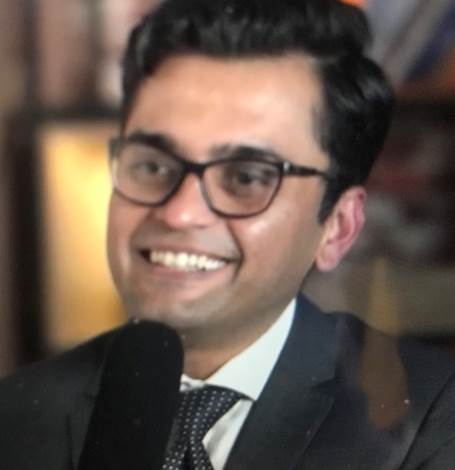
Usama Nizamani

Miftah Ismail
Miftah Ismail Speaks on “Reimagining Pakistan” for a Better Future
By Elaine Pasquini

Washington: Research journalist Usama Nizamani engaged in a wide-ranging conversation with former Pakistani finance minister Dr Miftah Ismail on the March 11 episode of InferTalks, a digital platform offering news and insights on global issues.
Addressing Pakistan’s current financial crisis, Ismail noted the immediate concern is to avoid a default on its $7 billion debt. “The effort to avoid a default has to begin with starting an IMF program or re-starting this IMF program or finishing this ninth review which has taken us many months.” Once that happens, he said, there will be more confidence in the market and “Pakistan will then have a slightly greater ability to borrow money from some commercial banks and attract investments from some friendly countries.”
On the subject of “pegging the dollar,” the former finance minister said he was not in favor of this practice. There are 230 million people in Pakistan who all have different demands for dollars and “it’s not possible for a central planner to figure out what should be the demand of dollars and what should be the supply of dollars and what trade the market will clear,” he explained. “It is best left for the market to decide this.”
The idea of propping up the currency, Ismail said, is not only a bad economic policy to begin with, but “when we have absolutely no money in our bank it’s just completely counter to any good economic reasonings.”
One obstacle to attracting foreign investors to Pakistan is the law-and-order situation, he lamented. “We need to improve the law-and-order situation so that foreigners start coming to Pakistan.” The price and reliability of energy is also a hindrance.
With respect to the decline in exports, one problem is that some Pakistani companies find it more lucrative to sell products within the country rather than to export. Currency manipulation also hampers exports, he added.
“Where we are today is not necessarily the fault of what has happened in the last one year or the last four years or the last ten years,” Ismail stressed. “I think it’s probably what’s happened in the last 75 years.”
But the current economic crisis, he argued, is being talked about because it is afflicting the middle class, not just the lower income workers. The household and day labor workers making 15,000 rupees ($53) a month have always struggled to provide for their families, he said, pointing out that 60 percent of Pakistanis have an income of less than 40,000 rupees ($142) a month for a family of six.
Poverty, food insecurity and healthcare need to be tackled, Ismail continued. Forty percent of children have stunted growth due to lack of sufficient nutrition. Another 28 percent are food insecure. “If millions of kids in Pakistan go to sleep hungry every night, then that is a matter of shame for the rest of us who have more than three square meals and we should understand that this is not how you run a country,” he stated. “It’s time that the elites of Pakistan…that we come together and understand it’s time to become Pakistanis in the real sense…and make sure that the rights of people who are downtrodden and poor are met.”
Noting that Ismail is a critic of the “one percent republic,” Nizamani asked the economist how he’d go about changing this situation.
“I think our elite need to understand that it is in their enlightened best interest to actually change the society a little and bring more new people into the fold increasingly and let growth be inclusive of gender, of alienated people and bring young people into the growth mainstream,” Ismail responded. “Those of us who are elites, those of us like me who have been in the government and very close to governments…we have failed our people.”
Pakistan needs to improve its education system so that children throughout the country, not just in Lahore or Karachi, are provided topnotch education, Ismail said. One-quarter of Pakistani children go to government schools run by the provinces for free, but these students have low scores in math and science. Another one-quarter of the country’s schoolchildren go to cheap private institutions, while the other half are not even in school. “These are self-inflicted wounds,” he insisted. “If Pakistan keeps half of our population uneducated or illiterate, as a nation we will continue to fall behind.”
In rural areas, parents should be on school boards, “even if the parents are not educated,” he insisted. It will give them the power to hire and fire teachers, “the government will pay for it, and you will see an improvement in the quality of education.”
The former minister frequently espouses the need for Pakistan to address the issue of its growing population. “Unless and until we do this, we will not have enough food to feed them or enough schools to educate them,” he argued. Bangladesh, Tunisia, Jordan, Indonesia and Morocco, he pointed out, are all Islamic societies that have managed to control their populations.
Responding to Nizamani’s query as to how to break “dynastic politics” in order to promote fresh leadership, Ismail suggested that turning Pakistan’s divisions into provinces would result in “different leaders coming from different divisions...so the powers of particular families will dilute,” and, as long as there are elections, people will “vote the dynasties out.”
Ismail criticized Pakistani politicians for not understanding the issues and problems in Pakistan, regardless of which political parties may be in charge. “In the last 20 years, we’ve seen martial law, hybrid [governments]; we basically need to change society,” he said.
“What we have done for 75 years is not how to run a country,” Ismail emphasized. “Let’s figure out how to do this better. I’m convinced that Pakistanis are not less than anybody else, but we need to have the right structure.”
(Elaine Pasquini is a freelance journalist. Her reports appear in the Washington Report on Middle East Affairs and Nuze.Ink.)

